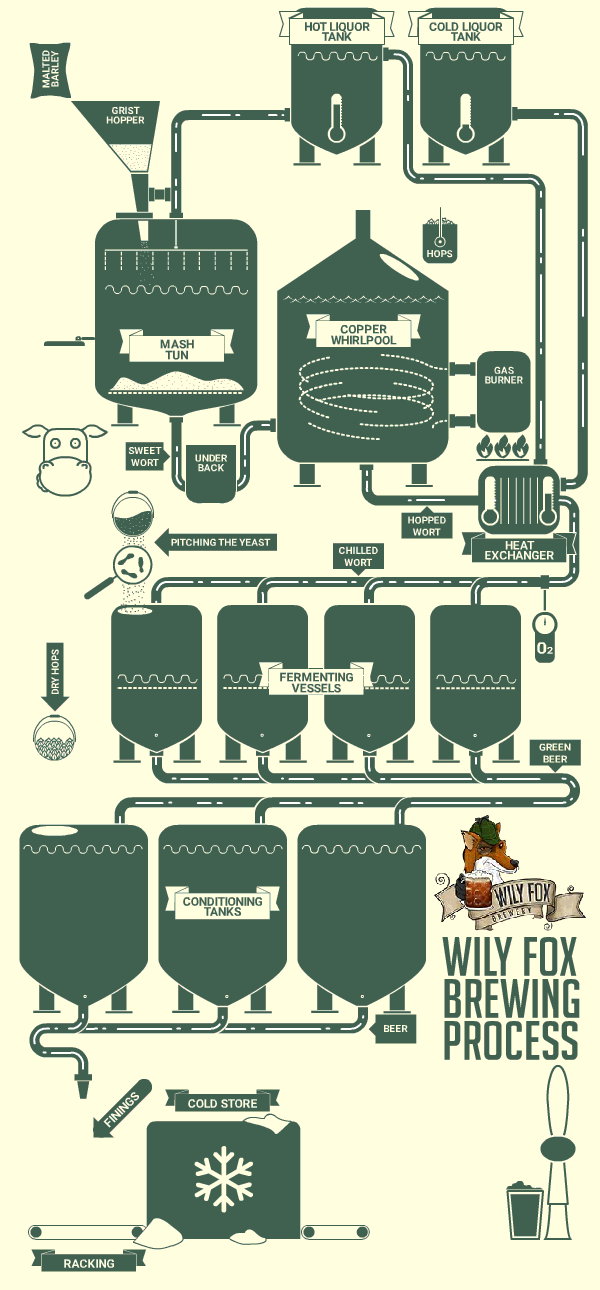THE BREWING PROCESS
Our animated graphic shows our brewing process using our unique and bespoke kit. The animation shows every stage of the process so you get a better idea of how much work and dedication we put in to deliver great beer.
Our animated graphic shows our brewing process using our unique and bespoke kit. The animation shows every stage of the process so you get a better idea of how much work and dedication we put in to deliver great beer.

Malt is produced by allowing barley grain to germinate, which creates the enzymes, required to convert starch into sugar. The malt is kiln dried. Speciality malts are roasted to varying degrees, to influence colour and flavour. The malt is then crushed in a mill to form the Grist.
The grist is mixed with Hot Brewing Liquor into the Mash Tun, to achieve a mash temperature of approx. 65degC. The temperature is critical, to gelatinize the starch and activate the enzymes responsible for saccharification, which is the conversion of starch to dextrins and fermentable sugars such as Maltose, which are metabolised by the yeast during fermentation. Mashing temperature also has a significant influence on the body of the beer. The more fermentable the wort, the thinner the beer. The less fermentable, the fuller the body.
After a stand of 90mins, starch conversion is complete. The mash is then sparged with more hot brewing liquor at 78degC to extract all the goodness from the grain. The Mash Tun has a slotted “false bottom”, which acts like a tea-bag/ sieve to separate the Sweet Wort from the grain. The wort is gravity fed to an intermediary Underback Vessel, and then pumped to the Copper/ Whirlpool, a process called Wort Run Off, which takes 2 hours.
The spent grains provide valuable feedstuff for the farmer’s cattle.
The sweet wort is boiled in the Copper/Whirlpool at 100degC for 75mins. This serves to:
At the end of the boil, the Hopped Wort is whirlpooled to separate the hops and protein matter.
The process of Wort Cooling is where the hopped wort is rapidly chilled from 95degC to 18degC, using a Paraflow Plate Heat Exchanger. Heat Recovery enables the ‘heated’ cooling water to be returned to the Hot Liquor Tank, to be re-used for subsequent brewing requirements. Oxygen is then added in-line to oxygenate the wort, ready for the yeast’s fermentation requirements.
The chilled wort is transferred to an FV (Fermenting Vessel), where it is pitched with a Top-Fermenting Yeast. Over a period of 3 to 4 days, the yeast metabolizes the wort, forming important flavour compounds and converting wort sugars to Alcohol and CO2. Heat is generated, but a controlled temperature of 21degC is maintained by having a cooling jacket on the FV.
At the end of fermentation, the yeast will have multiplied five-fold to create a thick creamy yeast head, which is harvested from the top of the beer for subsequent re-pitching. The “green” beer is then chilled down to 9degC over 3 days, causing excess yeast and protein to settle to the bottom of the FV.
Once chilled, the green beer is transferred to CT (Conditioning Tank) in the Cold Store, where Auxillary Finings are added to aid fining performance. This is also where Dry Hopping takes place. During storage, yeast and protein continue to settle out, whilst Hop Aroma and other flavours start to develop as the beer begins to mature and condition.
After 3 days, 9 gallon casks (Firkins) are filled from CT. Isinglass Finings (made from fish swimbladders) are added to the cask, which clarifies the beer of yeast and other solids. The casks remain in the Cold Store, where the beer undergoes secondary fermentation in the cask, thereby naturally carbonating the beer.
The casks are now ready to go out to trade, where they are stillaged in the pub cellar, allowed to settle and condition, before dispensing through a Beer Engine (hand-pump).
All Rights Reserved, Wily Fox Brewery LTD 2017
